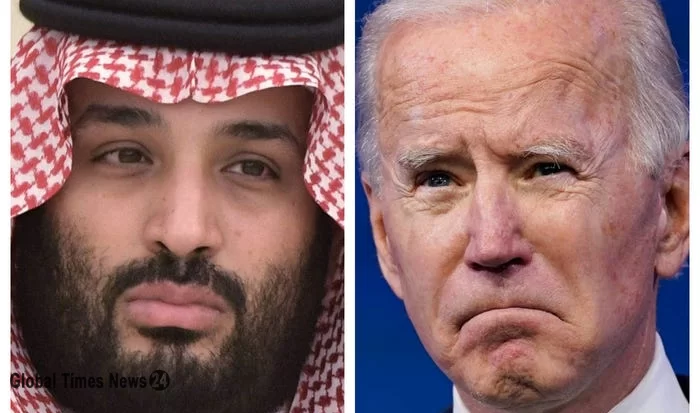Saudi-Israel normalization of relations; terms & conditions
For Saudi-Israel normalization, Riyadh has listed preconditions for Tel Aviv to normalize ties, Israeli Channel 12 reported.
Table of Contents (Show / Hide)

For Saudi-Israel normalization, Riyadh has listed preconditions for Tel Aviv to normalize ties, Israeli Channel 12 reported.
According to Israeli Channel 12, US Secretary of State Antony Blinken and National Security Adviser Jake Sullivan are involved in the negotiations alongside Mossad chief David Barnea and “very senior officials” close to bin Salman.
The Saudis listed "Tel Aviv peace talks with the Palestinians to form two independent Palestinian states" as one of the preconditions of normalizing ties with Riyadh.
These steps would include handing certain powers in the West Bank from the Israeli military to the Palestinian Authority forces, and giving the PA forces security-related authority at the Temple Mount and the Church of the Holy Sepulchre in Jerusalem’s Old City — far-reaching steps that are highly unlikely to be approved by Israel’s hard-right government.
MBS also stressed his commitment to Palestinian statehood at the 2023 Arab League summit, calling it a “central issue for Arab countries, and it is at the top of the kingdom’s priorities.”
 MBS says Palestinians ‘the central issue’ for Arabs, as US pushes Saudi-Israel normalization[/caption]
MBS says Palestinians ‘the central issue’ for Arabs, as US pushes Saudi-Israel normalization[/caption]
“We will not delay in providing assistance to the Palestinian people in recovering their lands, restoring their legitimate rights and establishing an independent state on the 1967 borders with East Jerusalem as its capital,” said MBD at Arab Summit this year.
The Saudi crown prince is seeking a civilian nuclear program and security assurances from President Biden, a steep price for normalization of relations with Israel.
According to Channel 12, Washington and Riyadh are pressuring Israel to accept these conditions to move forward with the normalization agreement.
The U.S. also allegedly asked Prime Minister Benjamin Netanyahu to shelve his judicial overhaul plan which has caused mass protests in Israel and concerns in the White House.
How do experts see Riyadh's conditions for Saudi-Israel normalization
Given the difficult relationship, the Saudi offer could be interpreted as a “rhetorical move,” said Abdulaziz Alghashian, a Saudi researcher who studies his country’s policy toward Israel. The goal might be to put Mr. Biden in the awkward position of refusing to deliver an agreement that Israel badly wants, an outcome that could disappoint Jewish American groups with political clout.
Mr. Alghashian said it was unlikely that Saudi officials would actually facilitate a major foreign policy victory for Mr. Biden while he was still president, given their grievances with his administration.
“The Saudi ruling elite do not want Biden to be the American president to take credit for Saudi-Israeli normalization, but they don’t mind Biden taking the blame for its absence,” he said.
Do US-Saudi relations impact Saudi-Israel normalization?
As a 2020 presidential candidate, Mr. Biden vowed to make Saudi Arabia an international “pariah” for its conduct in the war in Yemen, and to “pay the price” for the 2018 murder of the Saudi journalist Jamal Khashoggi. Early in his tenure, Mr. Biden released a classified intelligence report finding that the killing of Mr. Khashoggi was “approved” by Prince Mohammed. Since then, Saudi Arabia has angered Biden officials with cuts to oil production, which they say cost American consumers and generated profits for a Russian war machine heavily financed by oil.
Analysts believe that Saudi Arabia had lost trust in the United States as a defender of its security and is drawing nearer to China while seeking to ease its longtime rivalry with Iran as a hedging strategy.
So, Riyadh really doesn't see Washington as a broker of the Saudi-Israel normalization. That's why Saudi has come up with the terms and conditions that are hard to meet by both Washington and Israeli leaders.
What is holding back Riyadh to sign Saudi-Israel normalization?
The Saudi government has its hands full domestically because of the changes are associated with what is called Vision 2030, the centerpiece of MBS’s project of transformation. In the context of what is a socioeconomic revolution at home, normalizing relations with Israel is simply not a top priority, not least because it might generate more opposition to MBS and Vision 2030.
Polling in Saudi Arabia by outside organizations indicates that only 20 percent of the population approves of full normalization. Nonetheless, under such circumstances, and given Riyadh’s other concerns and the reforms already underway, it is understandable why this might not be a top priority for MBS.
With more than 20 million citizens, Saudi officials have less room to counter public opinion than their counterparts in smaller states like Bahrain and the United Arab Emirates.
Another concern relates to Saudi Arabia’s status as “the Land of the Two Holy Places” of Mecca and Medina. As home to the birthplace of Islam, the kingdom has the distinction of being the center of the Islamic world. While this confers major reputational advantages, it also increases the risks of normalization given that most of the world’s Muslims remain hostile to Israel. Thus, Saudi-Israel normalization could spark a global backlash from Muslims around the world.
[caption id="attachment_2010" align="aligncenter" width="900"]
Saudi Arabia’s decision in March to renew ties with Iran after over half a decade is also seen by some as a setback for Saudi-Israel normalization.
Saudi leaders have little to gain from doing the same, particularly when they can get what they want from Israel — from shared intelligence to state-of-the-art spyware — under the table, analysts say.
URL :
News ID : 2040

 Egypt ready to improve diplomatic ties with Iran
Egypt ready to improve diplomatic ties with Iran
 Nobel Peace Prize Awarded to Japanese Atomic Bomb Survivors' Organization
Nobel Peace Prize Awarded to Japanese Atomic Bomb Survivors' Organization
 SpaceX Starship lost on return to Earth after completing majority of third test flight
SpaceX Starship lost on return to Earth after completing majority of third test flight
 No 'military need' to use nuclear arms in Ukraine, says Russia
No 'military need' to use nuclear arms in Ukraine, says Russia
 Qatar and UN Collaborate on Facilitating Humanitarian Aid Access to Besieged Gaza
Qatar and UN Collaborate on Facilitating Humanitarian Aid Access to Besieged Gaza
 Fears of Bin Salman to reach the throne
Fears of Bin Salman to reach the throne
 Nakba 75: Palestinian citizens of Israel are exiles in their own land
Nakba 75: Palestinian citizens of Israel are exiles in their own land
 Mohamed bin Zayed's intensified pressure to oust his brother and appoint his son as crown prince
Mohamed bin Zayed's intensified pressure to oust his brother and appoint his son as crown prince
 Increase in the cost of Hajj up to 300% in 2022
Increase in the cost of Hajj up to 300% in 2022
 New crisis in Saudi-US relations
New crisis in Saudi-US relations
